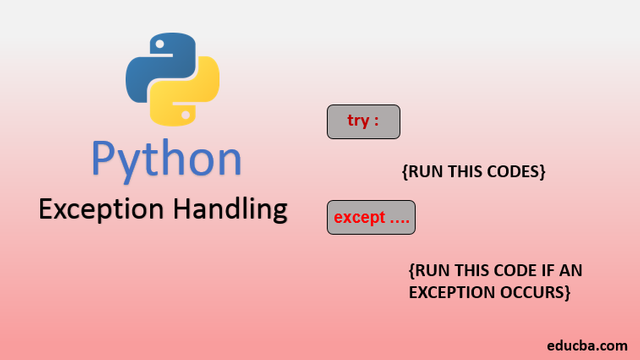exception in python
Python exception handling is a mechanism that allows a program to deal with unexpected situations or errors that occur during its execution. Instead of the program crashing, exception handling enables the program to catch and manage these errors gracefully, either by recovering from the error or by providing a meaningful error message.
Key Concepts in Python Exception Handling:
Exceptions: These are errors that occur at runtime. Common exceptions include
ZeroDivisionError,ValueError,FileNotFoundError, etc.try: The code block where you anticipate that an exception might occur. If an exception occurs within this block, the remaining code in the block is skipped, and the control moves to the
exceptblock.try: # Code that might raise an exception result = 10 / 0except: This block handles the exception. You can specify the type of exception you want to catch.
except ZeroDivisionError: print("You can't divide by zero!")else: The block of code inside the
elsestatement will execute if no exception was raised in thetryblock.else: print("Division successful")finally: This block will always execute, regardless of whether an exception occurred or not. It’s often used for cleanup actions like closing files or releasing resources.
finally: print("Execution completed")
Example:
try:
num = int(input("Enter a number: "))
result = 10 / num
except ZeroDivisionError:
print("Error: You cannot divide by zero.")
except ValueError:
print("Error: Invalid input. Please enter a number.")
else:
print(f"Result: {result}")
finally:
print("This block always executes.")
Output Scenarios:
If you enter 0:
- Output: "Error: You cannot divide by zero."
- "This block always executes."
If you enter a non-numeric value:
- Output: "Error: Invalid input. Please enter a number."
- "This block always executes."
If you enter a valid number:
- Output: "Result: (result of the division)"
- "This block always executes."
Python's exception handling allows you to create more robust and error-tolerant programs by managing errors rather than letting them crash your program.

"Great explanation of Python exception handling! 👍 It's essential to learn how to handle errors in our code to make it more robust and user-friendly. Can you share any real-world scenarios where exception handling made a significant difference? 💡 I'd love to hear about your experiences with this topic! 🤔"
I also gave you a 0.44% upvote for the delegations you have made to us. Increase your delegations to get more valuable upvotes. Cheers! 🎉
Help Us Secure the Blockchain for You
Your vote matters! Support strong governance and secure operations by voting for our witnesses:
Get Involved
"Wow, what a fantastic post on Python exception handling! 🤩 I love how you've broken down the key concepts into easy-to-understand sections, along with some awesome examples to drive the point home. 😊 The code snippets are super helpful, too! 👍 I'm definitely bookmarking this for future reference.
Great job, and thanks for sharing your knowledge with us! 🙏 If you have any more posts like this up your sleeve (pun intended 😉), please do keep 'em coming!
Also, don't forget to vote for our awesome witness, xpilar.witness, by heading over to https://steemitwallet.com/~witnesses. Your support means the world to us, and we're always looking for ways to improve and grow with this amazing community! 🌱"